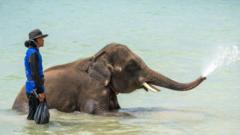Last week, a Spanish tourist, 22-year-old Blanca Ojanguren García, died after being gored by an elephant at the Koh Yao Elephant Care Centre in Thailand. The mahout, Theerayut Inthaphudkij, has been charged with negligence leading to death following the incident. While bathing the elephant, named Phang Somboon, the young woman was attacked, leading to severe injuries that ultimately resulted in her passing. This event has reignited debates surrounding the ethical implications of elephant interactions in tourism, drawing attention from animal rights activists who argue that such practices not only harm the animals but also pose significant risks to human safety. According to data from World Animal Protection, there are nearly 3,000 elephants in tourism venues across Thailand, underscoring the scale of the problem. Advocacy groups, including Peta, have been vocal in condemning interactions that compromise the well-being of elephants, suggesting these environments are not suitable sanctuaries. Similar cases have previously led to legal actions against mahouts, indicating a troubling pattern in animal tourism safety. The foreign minister of Spain has stated that the consulate in Bangkok is providing support to the victim's family in the aftermath of this tragedy.
Tragic Incident Highlights Risks of Elephant Tourism in Thailand

Tragic Incident Highlights Risks of Elephant Tourism in Thailand
A recent fatality involving a tourist and an elephant has sparked major concerns over the safety of Thailand's elephant tourism sector.
Further discussions on the moral responsibilities of animal tourism and the potential for reform in Thailand's elephant care practices are now more critical than ever.
Officials Charge Mahout in Death of Tourist, Renew Calls for Ethical Reform in Elephant Tourism
Officials Charge Mahout in Death of Tourist, Renew Calls for Ethical Reform in Elephant Tourism



















